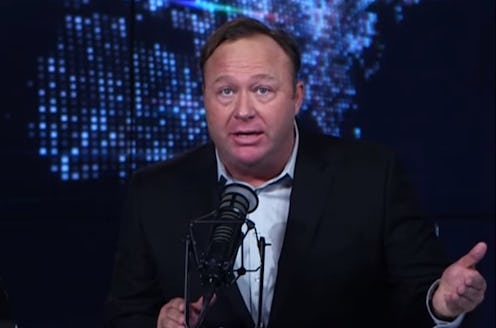News
Presidential Contenders Shouldn't Talk To This Guy

In politics, sometimes a candidate will be tarred through guilt by association, whether fairly on unfairly. Maybe they've appeared at an event with some controversial figure, or have endorsed someone or themselves been endorsed by a person with a controversial, inflammatory, or downright backwards view of the world, and it creates a question of judgment. And in the 2016 presidential election, you won't find a much better, more appropriate example than this: Donald Trump was interviewed by conspiracy theorist Alex Jones in December, and the GOP front-runner clearly has some warm feelings for the radio host and avowed 9/11 and Sandy Hook truther.
It's possible that you read about the interview when it happened about five months ago, back before a single vote had actually been cast in the GOP nominating process ― in other words, back when it was still possible to think, "Trump, whatever, whole thing will blow over eventually."
But in light of Trump's dizzying ascent to the position of likely Republican nominee and how much the anti-Trump movement has struggled to organize against him, this seems as good a time as any to revisit what might be his most controversial of all associations.
Jones, for the record, has previously professed a belief in countless conspiracy theories that (you'd think) would be off-limits for any presidential contender. He's argued in the past that the 9/11 terrorist attacks were an "inside job," that the Sandy Hook Elementary School shooting in Newtown, Connecticut, was a staged event with "crisis actors," that the Boston marathon bombing was similarly staged, and that government aircraft could have induced a lethal tornado in Oklahoma by "spraying and doing things" in the clouds.
He's also given platform to any number of other bizarre, inane ideas and people too, including British conspiracy theorist David Icke, who believes that world events are under the sway of a cabal of lizard people. That's right, we're talking about humanoid reptilian overlords here. There's also some medical quackery here and there for good measure too, of course ― Jones' website also markets colloidal silver generators, machines with which you're meant to huff silver particles in the event of a biological warfare attack (needless to say, this does no good, and poses health risks).
So, why would Trump sit down for a full 30 minutes with this guy? On the one hand, you could imagine that he might not be entirely aware of the full extent of Jones' views, although that's maybe more benefit of the doubt than Trump has earned. After all, the two men actually share a stated belief in one very prominent conspiracy theory ― that President Obama wasn't born in the United States, and is therefore ineligible to be president. Trump, in fact, was arguably the most famous birther in the movement's history, by virtue of his pervasive name recognition, and how he stoked the issue in the run-up to the 2012 election. Simply put, on this level at least, Trump and Jones are intellectually simpatico.
Conversely, though, you could suppose that Trump (like so many politicians past) is willing to reach out to any audience, no matter how dangerous and hysterical the ideas of the host might be. Supporting this interpretation is the fact that Trump isn't alone in having appeared on Jones' show ― former GOP presidential candidate Rand Paul, like his father Ron, has a distressingly long, friendly association with Jones, dating back prior to his 2010 Senate run.
But then, it doesn't exactly make sense why Trump would speak positively of Jones after the fact, especially during a campaign event that was being witnessed and reported by, shall we say, more traditional press outlets. As Jones himself proudly touted in January, Trump complimented him when asked during a January event, saying, "Alex Jones, he was a nice guy actually." During the actual interview with Jones, Trump also told him "your reputation is amazing," which might be the single biggest fib of the 2016 campaign season, in a very crowded field.
Maybe the explanation is as simple as getting attention wherever it's found, sure. It wouldn't be the first time Trump seemed willing to look anywhere for votes, of course. But lest anyone start thinking, "Hey, maybe Donald J. Trump will actually be a pretty strong general election candidate," this should serve as a cautionary (or reassuring) example ― the number and nature of the attacks he's opened himself up to throughout this primary campaign kind of boggles the mind, and suffice it to say he won't duck them as capably in front of a national audience as he will in a Republican primary.
Image: Alex Jones/YouTube